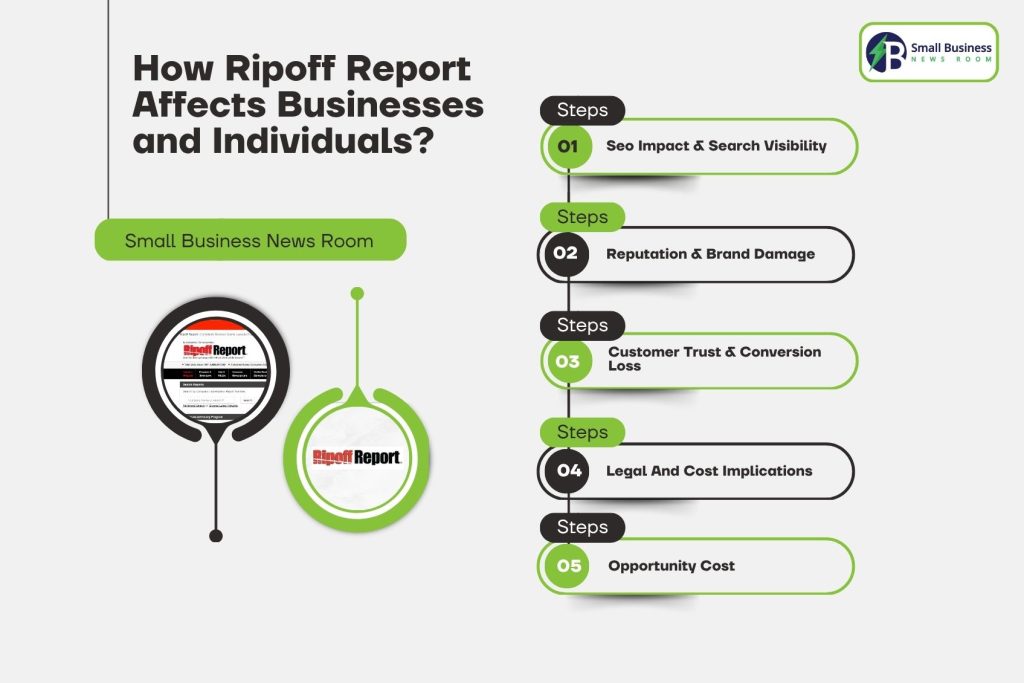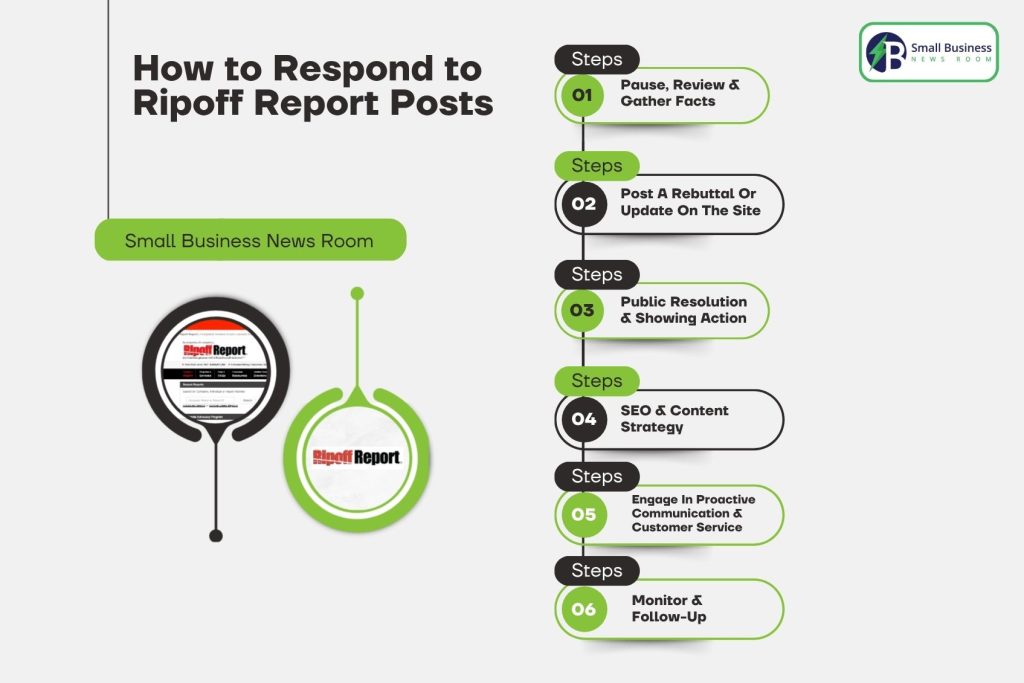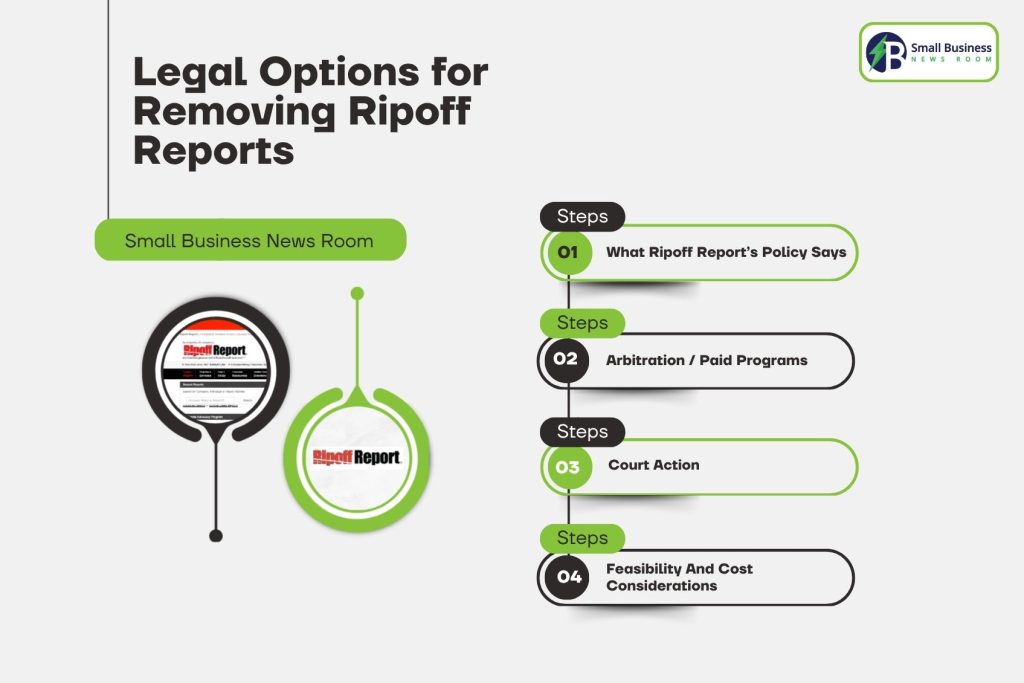Table Of Contents
- Understanding Ripoff Report
- How Ripoff Report Affects Businesses and Individuals
- Seo Impact And Search Visibility:
- Reputation And Brand Damage:
- Customer Trust And Conversion Loss:
- Legal And Cost Implications:
- Opportunity Cost:
- How to Respond to Ripoff Report Posts
- Pause, Review And Gather Facts:
- Post A Rebuttal Or Update On The Site:
- Public Resolution And Showing Action:
- SEO And Content Strategy:
- Engage In Proactive Communication And Customer Service:
- Monitor And Follow-Up:
- Legal Options for Removing Ripoff Reports
- What Ripoff Report’s Policy Says:
- Arbitration / Paid Programs:
- Court Action:
- Feasibility And Cost Considerations:
- What Are The Alternatives To Ripoff Report?
- Ripoff Report Scams: What To Watch Out For?
- What These Look Like:
- How To Protect Your Business:
- Why This Matters For You
Ripoff Report: Can You Revive Your Business After Complaints?
When someone Googles your company and sees a listing on Ripoff Report, the impact can be immediate and lasting. Ripoff Report is a high-visibility online complaints platform where disgruntled consumers or sometimes individuals with a gripe can publish detailed negative reports about businesses or people.
That means a single post can ripple out into larger problems: a dent in your online reputation, a drop in customer trust, or even questions about defamation and brand damage.
In today’s digital world, an uncontrolled negative review isn’t just a comment, it can become a persistent search-engine result, a thorn in your public profile, and a signal to potential clients that something is wrong.
In this article I will talk about the following things:
- What is Ripoff Report and how does it work?
- How it affects businesses and individuals?
- What you can do to respond, repair, and even prevent negative reviews?
Therefore, if these are some of the things that you want to know, keep reading till the end…
Understanding Ripoff Report

The website Ripoff Report was launched in 1998 by Ed Magedson through the operator Xcentric Ventures LLC. Its stated mission: to provide a forum for consumers to publish complaints about businesses or individuals—allegations of “being ripped off”, bad service, fraud, scams.
Here’s how it works in broad strokes:
- A user (consumer) creates a free account and files a “report” describing their negative experience.
- The site does some moderation (for prohibited content like personal data, obscene language) and then publishes the complaint.
- Business owners or individuals named in the report may create a free “Rebuttal” or “Update” via their account, to present their side.
- Ripoff Report’s terms make clear it will not remove the report simply because someone objects to it: it’s intended to be a permanent record of complaints.
- On the legal side: the site claims broad immunity under U.S. law, notably the Communications Decency Act §230, which protects platforms hosting user-generated content from being treated as the publisher of that content.
From a reputation-management standpoint, Ripoff Report occupies a different place than many review platforms. It’s less about star ratings and customer feedback; instead one negative “report” can stand alone as a strong signal.
Because these posts often index well in search engines, they can become front-page Google results when someone searches your business name. That means they can affect how you are perceived even before a customer reaches you.
In short: Ripoff Report is a powerful player in the realm of online complaints and a site any business or individual facing negative press should understand.
How Ripoff Report Affects Businesses and Individuals

When a business or individual finds themselves named on Ripoff Report, the consequences can be far-reaching:
Seo Impact And Search Visibility:
Because Ripoff Report pages are highly indexed and often rank well in Google results, a negative report can dominate search results for the business name.
That means for someone typing your company name into Google, the first thing they see may be the complaint rather than your website or positive content. This can steer potential customers away before you even have a chance to make your case.
Reputation And Brand Damage:
Having your company associated with the term “rip-off”, “scam”, or “complaint” creates an emotional barrier for customers. Even if the underlying claim is untrue or exaggerated, the mere presence of the negative report can sow doubt.
Trust is a key component in purchasing decisions—especially if you’re a service business, a B2B operation, or you handle large sums or long-term commitments.
Customer Trust And Conversion Loss:
If prospects search your business, see negative comments, and then hesitate or click away, your conversion funnel takes a hit. Existing clients may also question your reliability.
For individuals (consultants, freelancers, professionals) a listing on Ripoff Report can blur the line between personal and business reputation—making new leads think twice.
Legal And Cost Implications:
Dealing with a Ripoff Report listing often triggers additional time, legal fees, reputation-management costs. For a small business this may be disproportionate. Moreover, false or defamatory complaints might warrant a legal response—but the cost and complexity may make this unattractive. According to one review on SiteJabber:
“The fact that RipoffReport refused to remove this post … shows that the post itself is/was a vehicle for EXTORTION.”
Opportunity Cost:
Beyond the immediate damage, a Ripoff Report item can linger for years, reducing opportunities, making partnerships harder, increasing customer acquisition cost. The digital footprint remains.
How to Respond to Ripoff Report Posts

When you find a negative report on Ripoff Report referencing your business or name, here are effective steps to respond and potentially revive your business reputation.
Pause, Review And Gather Facts:
Don’t rush to respond in anger. Collect all relevant documentation dates, correspondence, proof of service/product delivery, customer communications. If the claim is valid in part, plan to address it sincerely rather than ignore it.
Post A Rebuttal Or Update On The Site:
Ripoff Report allows business owners the opportunity to register, and then post a “Rebuttal/Comment/Update” free of cost. This gives you a platform to present your side of the story.
When you post, keep it professional, acknowledge any valid concern, explain steps taken to remedy it, express your commitment to customer service. This isn’t about erasing the complaint — it’s about demonstrating transparency, accountability and responsiveness.
Public Resolution And Showing Action:
If you’ve resolved the customer issue behind the complaint, mention that in your rebuttal. If you’ve improved processes as a result, say so. It can reduce the sense of “I’m still dealing with this” in a visitor’s mind.
SEO And Content Strategy:
While the negative page remains, you can work to push other positive or neutral content higher in search results. That means optimizing your website, producing content (blog posts, case studies, testimonials), claiming your Google Business Profile, ensuring your social pages are active and positive. By increasing your share of online presence, you dilute the negative.
Engage In Proactive Communication And Customer Service:
Use the complaint as a trigger to audit your customer service, review feedback channels, respond to other online reviews (on Google, Facebook, Trustpilot) so you’re not playing defence all the time.
Monitor And Follow-Up:
After you respond, keep an eye on the report page (comments may come in), monitor your brand mentions online, set Google Alerts, etc. A sustained approach helps you rebuild trust over time.
By responding thoughtfully, transparently and strategically you send a message not only to the original author but to future readers: you’re responsive, you care about your reputation, you act. That alone helps rebuild some of the business reputation management footing.
Legal Options for Removing Ripoff Reports

When facing a negative report on Ripoff Report, you may ask: “Can I legally force it to be removed?” The short answer: it’s challenging but there are paths.
What Ripoff Report’s Policy Says:
According to their FAQ and terms of service, they have a policy of “No removal” for reports simply at the request of the business or individual.
Even reports claimed to be false are generally not removed unless a court order or specific finding of falsehood is presented. Their terms state they do not remove reports in their entirety simply because someone asks—and they retain the right to refuse edits or deletions.
Arbitration / Paid Programs:
Ripoff Report offers a “VIP Arbitration Program” (paid) which allows an arbitrator to review challenged statements of fact.
If the arbitrator finds them to be false, those specific statements may be redacted and search-engine de-indexing may be requested—but the original report remains live. This program can cost thousands of dollars.
Court Action:
If you believe the post is defamatory i.e., false statements of fact published that harm you. You could pursue a defamation lawsuit. But you would need to:
- Identify the author (which may be anonymous).
- Demonstrate falsity of the statement and harm suffered.
- Consider statute of limitations and jurisdiction issues. Also, because the platform claims immunity under Section 230 (and in some jurisdictions the platform’s user-generated content protections apply) your chances against Ripoff Report itself may be limited.
Feasibility And Cost Considerations:
These legal routes are expensive, time-consuming and uncertain. For many small businesses the cost may outweigh the benefit. In many cases the more realistic strategy is ‘reputation repair’ rather than full removal.
Note: While removal of a complaint from Ripoff Report is rarely straightforward, you do have legal rights and alternatives—but one must be realistic about cost, timeframe and likelihood of success. The more viable path for many is to respond, mitigate, and rebuild rather than await a complete takedown.
What Are The Alternatives To Ripoff Report?
There are numerous other platforms where complaints or review-type feedback are posted—and each offers different dynamics for reputation management.
- Better Business Bureau (BBB): A U.S.-based organisation that allows businesses to be rated and reviewed, files are maintained, and resolution of customer complaints is tracked. Offers more structured dispute-resolution and allows businesses to respond publicly.
- Trustpilot: A consumer-review site where customers leave star ratings and comments. Businesses may request reviews and respond to reviewers; the open nature means proactive management is possible.
- SiteJabber: Focuses on online businesses (e-commerce) but more widely applicable; allows users to leave free reviews and businesses to respond and manage their profiles.
Ripoff Report Scams: What To Watch Out For?
While many complaints posted on Ripoff Report may be valid consumer grievances. There are also scam-style dynamics and fraudulent posts that businesses should be alert to.
What These Look Like:
- Anonymous complaints from unverifiable authors: Because Ripoff Report allows users to post with minimal verification (authors must certify they are truthful but the site does not guarantee authenticity) some posts may be false, motivated by revenge, competition, or extortion.
- Threats of “we’ll add another complaint unless you pay”: Some reviews and commentary allege that Ripoff Report’s model encourages businesses to pay for “investigations” or removal options. One Wikipedia entry states the site offers paid investigation services and has been accused of extortive practices.
- Fake complaints timed to coincide with Google searches or brand launches: A business may see a sudden negative listing appear just when visibility is increasing. Because the listing gets indexed quickly, it may capture a segment of traffic before you know.
- Mirror sites or domain confusion: Some businesses report the “Ripoff Report” name being used in mirror or copy-sites. Or scammers claiming affiliation with Ripoff Report demanding payment for removal. One Reddit post states:
How To Protect Your Business:
- Regularly search your business name + “ripoff report”: Early detection gives you more time to respond.
- Don’t pay random demands: If you receive an unsolicited offer to “remove” a Ripoff Report listing for a fee, treat it with caution. There are reports of extortion-style offers tied to these platforms.
- Document and respond quickly: Even if you suspect a complaint is fake, treat the listing professionally. Post your rebuttal, document evidence, and monitor search-engine ranking.
- Consider consulting legal/ORM experts: If patterns of fake complaints appear (multiple posts, same author, possible competitor involvement) you may need a professional to advise on defamation, trademark abuse or unfair competition.
- Use search-engine strategy: A negative listing remains live, so you need to push positive or neutral content upward in search rankings: blog posts, press releases, social media content, testimonials. Over time you can “crowd out” the negative listing from top search positions.
Why This Matters For You
If a business underestimates the risk of scam complaints on Ripoff Report. They may invest time and resources into fighting one listing when the real issue is structural: how they monitor, how they respond, how visible they are.
A one-off negative listing may not be the worst thing but if it is tied to fraudulent or vexatious complaints, the cost of ignoring it is high.
Recognising the scam dimension gives you a more realistic lens. Your adversary may not simply be a dissatisfied customer, but someone using the platform to harm your brand.















